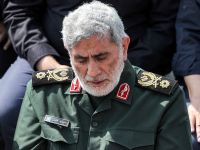Palestinian President Yasser Arafat declared Thursday he was hopeful Israel might match its retreat from southern Lebanon with a withdrawal from the Palestinian territories.
Calling Israel's decision to unilaterally withdraw from southern Lebanon "very important," the Palestinian president said he hoped Israeli Prime Minister Ehud Barak would do the same in the occupied Palestinian territories and the Golan Heights.
Speaking after a meeting in Lisbon with Portuguese Foreign Minister Jaime Gama, Arafat said Europe's assistance was desperately needed to help reach a peace accord in the Middle East.
Gama met the Palestinian president as the acting president of the European Union, a rotating post which Portugal now holds.
"Now is the time for the Middle East peace process to take a big step forward," Gama said.
The Portuguese foreign minister said Arafat's visit was a sign that the Palestinian leader would like the European Union to take a more active role in peace talks.
Arafat also saluted US President Bill Clinton's assessment of new Jewish settlements in the West Bank, which Clinton said were damaging to the peace process.
The president was expected to meet Portuguese President Antonio Guterres before leaving Lisbon Thursday evening.
Arafat met Wednesday with French leaders to discuss the future of talks with Israel.
The next round of Israeli-Palestinian negotiations is scheduled to begin Sunday in Eilat, Israel, in the hopes that a framework accord on the final status agreement can be reached by May and that the definitive agreement can be finalized by September 13.
PALESTINIANS TO INSIST ON FULL PEACE DEAL WITH ISRAEL
A fresh round of Israeli-Palestinian peace talks is due to kick off in Israel on Sunday with Palestinians demanding nothing less than a full peace accord, despite increasing doubts that an upcoming target date can be met.
Both sides have expressed hope that the new series of negotiations, to be held in the Red Sea resort of Eilat, will be more productive than two previous rounds in Washington, where differences over the borders of a future Palestinian state, the status of Jerusalem and the return of Palestinian refugees proved too wide to bridge.
Under the existing, self-imposed peace schedule, the two sides are supposed to have a framework "final status" agreement in place by May 13 and a definitive accord signed by September 13.
But Israeli Foreign Minister David Levy hinted that the May deadline for the blueprint agreement might not be met.
"Concluding a framework accord in May or June is not what is important. The essential thing is the agreement on the final status and to reach it the Palestinians must understand they must also make concessions," Levy said.
US Middle East troubleshooter Dennis Ross will reportedly sit in on the Eilat talks and shuttle progress reports between Israeli Prime Minister Ehud Barak and Palestinian leader Yasser Arafat, according to Israeli officials quoted in the media.
US Secretary of State Madeline Albright is also due to visit the region during the next six to eight weeks to arrange a possible summit between Arafat, Barak and US President Bill Clinton, depending on the results of the negotiations, according to US officials and Israeli media reports.
ISRAELIS, PALESTINIANS TO CONSIDER AIRPORT COOPERATION
Israel could run Atarot airport jointly with the Palestinian Authority. This possibility was raised by Israeli and Palestinian negotiators during talks in Jericho last week, an Israeli daily reported Thursay.
Israel defines Atarot, across the Green Line in northern Jerusalem, as an international airport, said the Jerusalem Post said. In effect, it is used only for local flights because of a United Nations General Assembly resolution barring it from international status. Most of its flights are Arkia's, en route from Tel Aviv's Sde Dov, via Atarot to Eilat and back.
The company recently announced its intention to cut back, and possibly close, its operations at Atarot – (Several Sources)
© 2000 Al Bawaba (www.albawaba.com)







